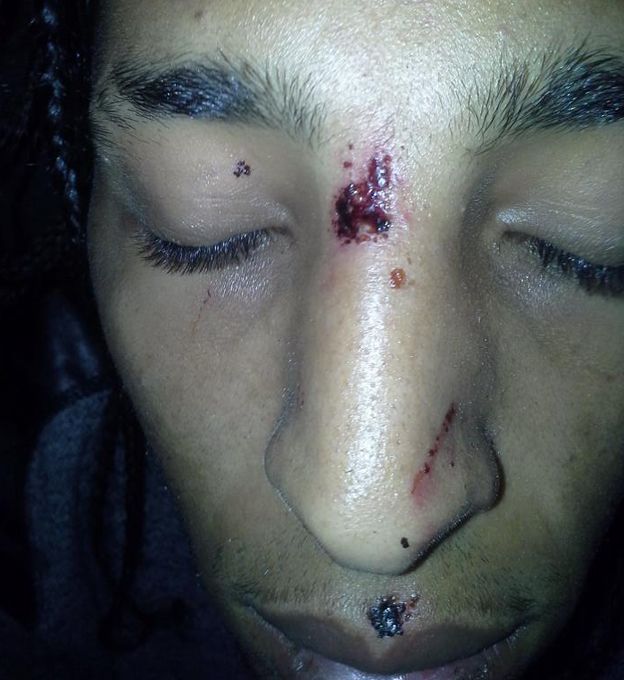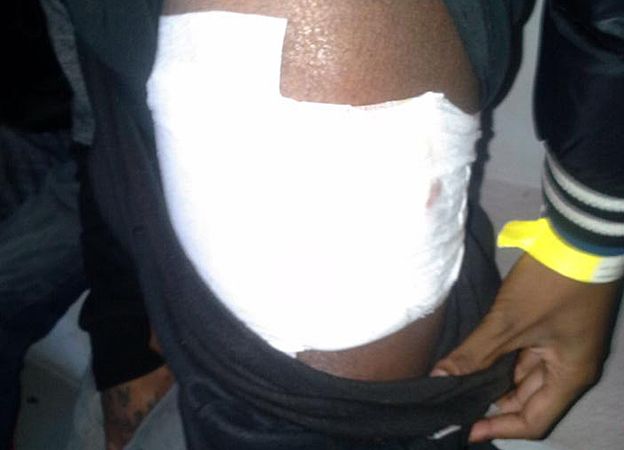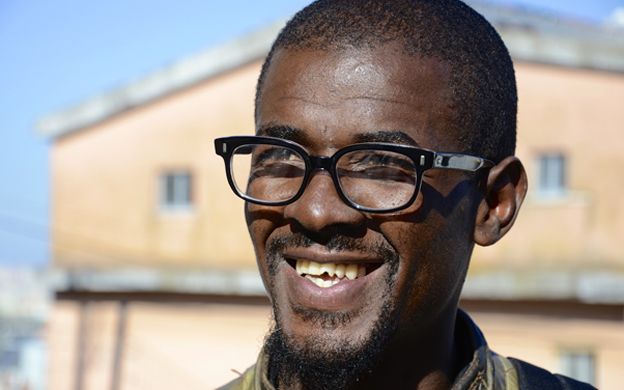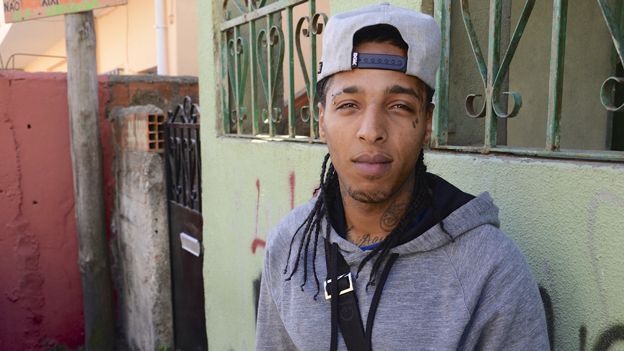Mr Uncle Leroy
All Star
'They hate black people'
By James FletcherBBC News

How realistic is online voting at UK elections?
Portugal is often praised for its success in integrating immigrants but in the suburbs of Lisbon police are being accused of racism and brutality.
Jailza Sousa's young son is afraid when she hangs out the washing on their first-floor balcony.
"He's traumatised," says the 29-year-old from Cape Verde. "He says, 'Don't go there because you're going to get shot.'"
Looking down the narrow, potholed streets, she remembers what happened one day in February, earlier this year.
It was noon in Cova da Moura - a ramshackle suburb on a hill on the outskirts of Lisbon built by immigrants from Portugal's former African colonies.
The restaurants serve cachupa, a slow-cooked stew of corn, beans and meat which is the national dish of Cape Verde. The streets resonate to the sounds of music from Angola.
It's a colourful, friendly place by day, but it has a reputation for drugs, crime and violence. It's a place that taxi drivers refuse to go at night.
On 5 February, a team of police officers had a young man called Bruno up against a wall. They were searching him and started beating him - his blood stained the wall and street for several days afterwards. Bystanders started protesting, and the police reacted with shotguns loaded with rubber buckshot.

Jailza Sousa on her balcony
"A policeman came walking in this direction, and he pointed a gun," says Sousa. She had just hung out her washing, and was mopping the floor.
"He shot me in the chest, then when I was trying not to fall, he cocked his gun and hit me again in the hip.
"He saw me trying to recover my balance, if it had been by chance he wouldn't have shot the second time - and he did."
"They treat us like animals," Sousa says of the police. "It's a black neighbourhood - they treat us like we're all here to be exterminated."
Sousa was taken to hospital while two people who work for a local human rights organisation, Moinho de Juventude, or Mill of Youth, set off for the police station to find out what had happened to Bruno.

Bruno after he was released
The two men, Flavio Almada and Celso Lopes, were accompanied by about five other young men who had witnessed the incident.
When they arrived at the police station, they say three police officers were blocking the entrance.
"Suddenly about 15 or 20 cops came with sticks, with shotguns, and started trying to kick and punch us, trying to hit us with batons," says Lopes.
"And I said 'OK, I'm leaving,'" claims Almada. But he says one police officer cocked his shotgun. "And quickly, he shoot."
Lopes was hit in the leg by rubber buckshot. He, Almada and three others were then taken inside the police station, where they were handcuffed. They allege the beatings continued accompanied by extreme racist abuse.

Lopes's leg after he was treated in hospital
Almada says one officer told him, "You don't know how much I hate you. If I had the power, you would all be exterminated."
He says he was terrified. "I will never forget his face. I will never forget his words."
The men claim other police officers told them they should join Islamic State.
Lopes says for five hours they received no medical attention. Eventually all five men were admitted to hospital.
Almada says he suffers from terrible nightmares and some of the injuries have still not healed. When he smiles he reveals a chipped front tooth.

Four separate investigations are underway into what happened. Both the Interior Ministry and Portugal's racial discrimination commission are investigating the conduct of the police.
Listen online
Almada, Lopes and their friends face charges of invading the police station, and they in turn are pressing their own charges of torture and racism against the police.
"When the police come the police are the law," says Lopes. "You are no longer living in a democracy, you are living in a police state."
The BBC requested an interview with the police to discuss the incident and relations with communities such as Cova da Moura, but the police declined.
At the time, the media reported that Bruno had thrown a rock at a police van, breaking a window and injuring an officer. Bruno and eyewitnesses deny this.

Bruno says he was singled out by the police
It was also reported that the men had tried to storm the police station and that the five who were detained had suffered "minor" injuries after resisting arrest. There were later reports that a police officer was taken to hospital with a broken arm.
This incident re-ignited long standing claims of police brutality and racism - a story told in the graffiti on Cova da Moura's walls.
A video circulating on social media shows another recent police raid in Cova da Moura which was filmed by a resident. In the early hours of the morning, police with shotguns and wearing balaclavas can be seen walking through the streets, and shots can be heard.
'Police State' Portugal is broadcast on Crossing Continents on Thursday 23 April at 11:00 BST on BBC Radio 4. It is on Assignment on BBC World Service on the same day.
Subscribe to the BBC News Magazine's email newsletter to get articles sent to your inbox.
http://www.bbc.com/news/magazine-32419952?post_id=100001552849580_926027117459041
By James FletcherBBC News
- 23 April 2015
- From the sectionMagazine

How realistic is online voting at UK elections?
Portugal is often praised for its success in integrating immigrants but in the suburbs of Lisbon police are being accused of racism and brutality.
Jailza Sousa's young son is afraid when she hangs out the washing on their first-floor balcony.
"He's traumatised," says the 29-year-old from Cape Verde. "He says, 'Don't go there because you're going to get shot.'"
Looking down the narrow, potholed streets, she remembers what happened one day in February, earlier this year.
It was noon in Cova da Moura - a ramshackle suburb on a hill on the outskirts of Lisbon built by immigrants from Portugal's former African colonies.
The restaurants serve cachupa, a slow-cooked stew of corn, beans and meat which is the national dish of Cape Verde. The streets resonate to the sounds of music from Angola.
It's a colourful, friendly place by day, but it has a reputation for drugs, crime and violence. It's a place that taxi drivers refuse to go at night.
On 5 February, a team of police officers had a young man called Bruno up against a wall. They were searching him and started beating him - his blood stained the wall and street for several days afterwards. Bystanders started protesting, and the police reacted with shotguns loaded with rubber buckshot.

Jailza Sousa on her balcony
"A policeman came walking in this direction, and he pointed a gun," says Sousa. She had just hung out her washing, and was mopping the floor.
"He shot me in the chest, then when I was trying not to fall, he cocked his gun and hit me again in the hip.
"He saw me trying to recover my balance, if it had been by chance he wouldn't have shot the second time - and he did."
"They treat us like animals," Sousa says of the police. "It's a black neighbourhood - they treat us like we're all here to be exterminated."
Sousa was taken to hospital while two people who work for a local human rights organisation, Moinho de Juventude, or Mill of Youth, set off for the police station to find out what had happened to Bruno.

Bruno after he was released
The two men, Flavio Almada and Celso Lopes, were accompanied by about five other young men who had witnessed the incident.
When they arrived at the police station, they say three police officers were blocking the entrance.
"Suddenly about 15 or 20 cops came with sticks, with shotguns, and started trying to kick and punch us, trying to hit us with batons," says Lopes.
"And I said 'OK, I'm leaving,'" claims Almada. But he says one police officer cocked his shotgun. "And quickly, he shoot."
Lopes was hit in the leg by rubber buckshot. He, Almada and three others were then taken inside the police station, where they were handcuffed. They allege the beatings continued accompanied by extreme racist abuse.

Lopes's leg after he was treated in hospital
Almada says one officer told him, "You don't know how much I hate you. If I had the power, you would all be exterminated."
He says he was terrified. "I will never forget his face. I will never forget his words."
The men claim other police officers told them they should join Islamic State.
Lopes says for five hours they received no medical attention. Eventually all five men were admitted to hospital.
Almada says he suffers from terrible nightmares and some of the injuries have still not healed. When he smiles he reveals a chipped front tooth.

Four separate investigations are underway into what happened. Both the Interior Ministry and Portugal's racial discrimination commission are investigating the conduct of the police.
Listen online
Almada, Lopes and their friends face charges of invading the police station, and they in turn are pressing their own charges of torture and racism against the police.
"When the police come the police are the law," says Lopes. "You are no longer living in a democracy, you are living in a police state."
The BBC requested an interview with the police to discuss the incident and relations with communities such as Cova da Moura, but the police declined.
At the time, the media reported that Bruno had thrown a rock at a police van, breaking a window and injuring an officer. Bruno and eyewitnesses deny this.

Bruno says he was singled out by the police
It was also reported that the men had tried to storm the police station and that the five who were detained had suffered "minor" injuries after resisting arrest. There were later reports that a police officer was taken to hospital with a broken arm.
This incident re-ignited long standing claims of police brutality and racism - a story told in the graffiti on Cova da Moura's walls.
A video circulating on social media shows another recent police raid in Cova da Moura which was filmed by a resident. In the early hours of the morning, police with shotguns and wearing balaclavas can be seen walking through the streets, and shots can be heard.
'Police State' Portugal is broadcast on Crossing Continents on Thursday 23 April at 11:00 BST on BBC Radio 4. It is on Assignment on BBC World Service on the same day.
Subscribe to the BBC News Magazine's email newsletter to get articles sent to your inbox.
http://www.bbc.com/news/magazine-32419952?post_id=100001552849580_926027117459041

